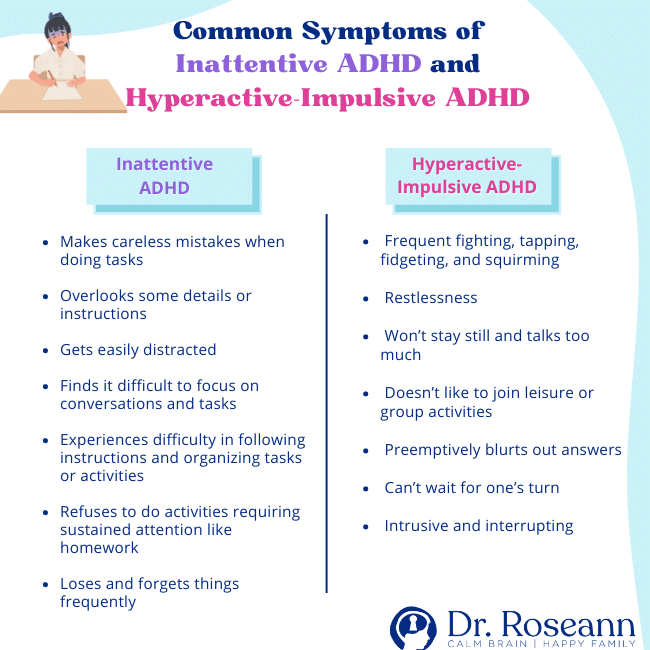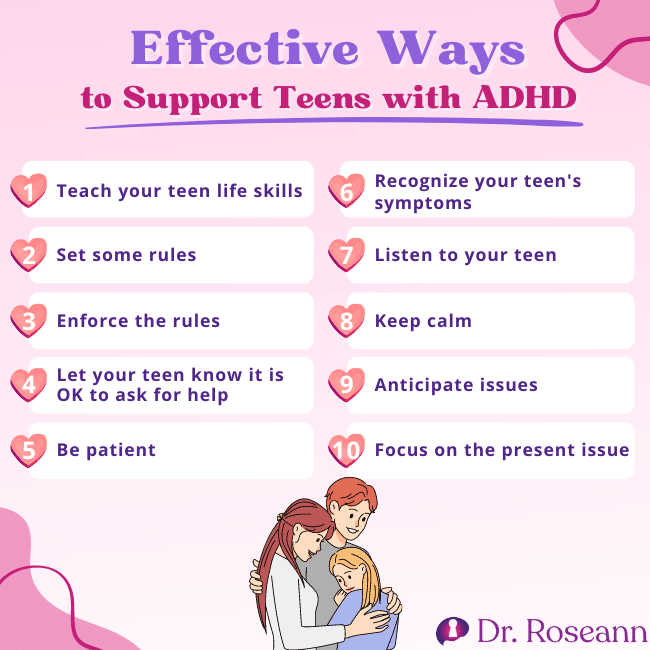ADHD or Attention Deficit Hyperactivity Disorder is the most common neurological disorder diagnosed in children. Statistics show that 9.4% of children in the United States aged 2-17 years old have ADHD. That's approximately 6.1 million kids who have received the diagnosis (CDC 2020).
The national institute of mental health estimates ADHD in adults at approximately 4.4% of the US population.
This goes to show that ADHD doesn't go away during adolescence. If left unmanaged, it would persist into adulthood. However, ADHD in teens looks different than ADHD in children. Parents should know the signs of ADHD in teens if it was missed during early childhood as it will have even more effect on them as adults.
Symptoms of ADHD in Teens

The diagnosis of ADHD in teens is also slightly different from younger children. To diagnose ADHD in teens, they need to exhibit at least five symptoms from the list below. Kids, on the other hand, have to show six.
There are three presentations of ADHD and these are predominantly inattentive, predominantly hyperactive-impulsive, and combination. The common symptoms of inattentive ADHD and hyperactive-impulsive ADHD are listed below.
Teens with attention deficit disorder will have the following symptoms:
- Makes careless mistakes when doing tasks
- Overlooks some details or instructions
- Gets easily distracted
- Find it difficult to focus on conversations and tasks
- Experiences difficulty in following instructions and organizing tasks or activities
- Refuses to do activities requiring sustained attention like homework
- Loses and forgets things frequently
If the teen has the hyperactivity and impulsivity type of ADHD their symptoms are five or more of the following:
- Frequent fighting, tapping, fidgeting, and squirming
- Restlessness
- Won't stay still and talks too much
- Doesn't like to join leisure or group activities
- Preemptively blurts out answers
- Can't wait for one's turn
- Intrusive and interrupting
If the teen has a combination presentation, then they exhibit symptoms from both categories. Furthermore, these symptoms should be severe, persist for over six months, and negatively impact the teen's academic, personal, and social skills.
The symptoms shouldn't be associated with any other developmental or mental health issues. For example, focus problems can't result from primary depression or anxiety.
Also, the teen must have exhibited the symptoms before turning 12 years old (NIMH, 2021). This is extremely important as ADHD symptoms don't just appear, so if a focus problem does suddenly appear, other clinical issues must be ruled out. There are a number of issues that could be affecting your child in school besides ADHD.
This ADHD checklist may help you to better understand your child's symptoms.
How Does ADHD Affect Teens?
Teenage years are already exhausting even without ADHD. So, for teens with ADHD and their parents, it's twice as hard. Parents are always looking for better ways to support their struggling ADHD teen.
All teens face peer pressure, physical changes, emotional difficulties, and academic expectations as they enter puberty. Those with ADHD go through a lot more, including having strained executive functioning skills. That means organizing and planning for a future task is very hard. If you can't “see” the end result, then how can you start and complete something?
Aside from more intensive schoolwork, adolescence is also a time for milestones. It is when one learns how to drive a car and form deeper relationships with friends. For these activities and many others, a teen's attentive or hyperactive and impulsive behaviors can sometimes get in the way.
Without adequate support, teens with ADHD are exposed to a lot of risk factors that parents should be concerned about. Teens without guidance, more so those who are suffering from ADHD, are prone to making poor decisions that could follow them through adulthood.
The effect of untreated ADHD in teens can lead to low academic performance, which for some, would lead to the failure to graduate from high school. This is also the time when they spend most of their time on social media and go through all the negative effects of that.
Teens with ADHD may also go through more aggravating situations such as car accidents, unwanted pregnancy, and substance abuse, among others. This is why parental intervention and a professional treatment plan are necessary to possibly prevent the occurrence of such risky behaviors.
ADHD in Teen Girls
Understanding ADHD in teen girls is crucial, as it often presents differently than in boys. Teenage girls with ADHD may exhibit symptoms that overlap with other mental disorders, complicating diagnosis and treatment. Key signs include inattention, disorganization, and emotional dysregulation, rather than the more overt hyperactivity frequently seen in boys. Recognizing these distinct ADHD symptoms in teen girls is vital for effective intervention.
Effective ADHD treatment for teenage girls usually involves a combination of therapies and should include behavior therapy. It may even mean for some a school for teens with ADHD. Managing ADHD symptoms in these young women requires a sensitive and tailored approach. Behavior therapy plays a critical role in helping them develop essential coping strategies for both academic and social success.
Addressing ADHD in teen girls is not just about managing symptoms, but also empowering them to navigate the challenges of adolescence with confidence and resilience.
Diagnosis of ADHD in Teens
Diagnosing ADHD in teens is similar to the diagnosis used on young children. However, there are some differences, particularly because teens are likely to be predominantly inattentive rather than hyperactive. Their hyperactive-impulsive symptoms mostly constitute restlessness and fidgeting but can also reflect “handsy” behaviors where kids touch things and people more than they should.
The assessment process may also be longer in teens, as they don't have one teacher who observes them for an extended period. Some of your teen's teachers in middle school and high school rarely know them, which makes diagnosis more cumbersome.
Teens also tend to deny their symptoms of hyperactivity, impulsivity, or attention deficit and are unlikely to self-report. They may even be resistant to the process due to feelings of shame, embarrassment, or upset.
To address this, it may be necessary to treat teens just like adults, like asking for their consent to discussions and treatments in an attempt to solicit their cooperation.
There's also the need to obtain the teen's educational history starting from preschool to the present, with emphasis on their behavioral and academic functions. Their history should come from many sources and identify their weaknesses and strengths.
When looking back, behavioral signs may be easier to spot. I recall one college student who did well all the way through high school but when we backed at Jeff's records right from preschool, there were notations about his impulsivity (and brightness). He was so bright that it wasn't until the executive functioning heavy tasks that college demanded, did Jeff's ADHD really get in the way of his performance.
Teens may require a vocational evaluation and a deeper psychoeducational evaluation. These types of assessments help us to better understand what a teen is good at and needs support in.
Supporting their gifts not only is stimulating, but it just might turn into their vocation. The school may help assess the teen's academic issues and needs to help put a plan in place.
For teens, comorbidity is common and should be considered during diagnosis. Similar symptoms of anxiety disorders, learning difficulties, bipolar disorders, mood swings, sleep deprivation, conduct disorder, and oppositional defiant disorder should be carefully evaluated.
Effective Ways to Support Teens with ADHD

As parents, there are a lot of things that you can do to help your child manage their ADHD symptoms. Even when you feel like you have tried a lot, our teens need us to be more connected and patient, as well as set boundaries. You need the right facts about ADHD and a path to supporting their ADHD brain.
Here are some of the things you can do to support your teen's ADHD:
#1 Teach your teen life skills
Parents should prepare their teens for adult life. Teach them how to schedule, organize, and plan their day. Chores and learning everyday skills are important. Even though teens with ADHD may be very verbal, be very patient with them when their attention fluctuates. Start small. Remember that small steps can go a very long way.
#2 Set some rules
Set rules for your teens and ask them to abide by them. For example, insist that your teen gets home after school. They have to call you if they're running late or if they're going somewhere else. Lay out clear rules and consequences. Enforce the rules and stick to them because consistency increases learning.
#3 Enforce the rules
When you create rules, be sure to enforce them. Otherwise, the rules become useless. Know the difference between a rule, command, and request. Treat each one accordingly and stand firm. Consistency is the key.
#4 Let your teen know it is OK to ask for help
Asking for help is a sign of maturity. Let your teen understand that asking for help doesn't mean they are weak. It means they're being responsible enough not to commit a mistake. Meet their questions with patience and mindfulness.
#5 Be patient
When it comes to teens with ADHD, nagging and overreacting just don't cut it. You can't nag them into making their brain work. Always remember that the brain of teens with ADHD doesn't act like most of their peers. Oftentimes, it's delayed. So, mistakes will happen from time to time. The most important thing is that you get involved and help them go past their mistakes.
#6 Recognize your teen's symptoms
ADHD teens have a lot of things that they can't control. Learn about your child's symptoms. Don't punish or criticize your child if they are disorganized, forgetful, or restless. It's part of their brain's orientation and they need your help to improve their executive functions.
#7 Listen to your teen
Hear out your teens whenever they want to share their views, especially if it is about something that affects them. Foster open communication with your teen as it encourages them to be honest. If your teen has to vent from time to time, give them the space to.
For example, listen to your teen if they have something to say about the rules they have to abide by. They are likely to follow the rules if they were included in the process of making them. Include them, but let them understand that you're still in control.
#8 Keep calm
If your kid is tense, anxious, or emotional, you need to remain calm. In the same way, don't be the first one to lose their cool. Arguing with your ADHD teen will take you nowhere. “Sharing your calm” means your children co-regulate off of your energy, so make sure to breathe through the next time your teen makes a snarky remark. That means adding things such as breakthwork, PEMF or magnesium to your daily routine.
#9 Anticipate issues
Teens with ADHD will encounter problems along the way. After all, many other teens likely would. Be one step ahead by creating a line of action in case problems occur. For starters, prepare for when your teen skips school and breaks the curfew.
#10 Focus on the present issue
Do not bring up past issues when you're dealing with a current problem. That's counterproductive because it will distract your teen from the problem at hand. It's not going to solve the problem and will likely escalate it.
Help for Teens with ADHD
If your teen has ADHD, the support they need from you is colossal. Understand that they go through a lot of frustration, isolation, and rejection than their peers. You need to be more patient with your teen. They need more understanding and a lot less criticism or nagging.
As your teens enter adolescence, it isn't just their bodies that are changing. Their brain chemicals shift as well. It's why their minds and emotions change almost every day, and all these can take a huge toll on them. Parents must know what treatment options, such as vitamins for attention, are available to them without resorting to ADHD medications with many side effects.
Parents should have their own set of coping strategies to help their teens get through every ordeal. The use of the family's bonding time to teach a teen with ADHD crucial executive function skills is going to be very helpful. Involve the help of other family members to make it even more effective.
Aside from getting support at home, teens may also benefit from a 504 Accommodation Plan or IEP in school, counseling, and cognitive behavioral therapy, among others. At our Ridgefield clinic and virtually, we offer natural solutions to ADHD in teens and children to calm their brains and get them through their daily life healthily and happily without using stimulant medications or straight ole talk therapy. We use science-backed solutions to help kids thrive.
Citations
Centers for Disease Control and Prevention. (2020, June 15). Data and Statistics on Children's Mental Health. https://www.cdc.gov/childrensmentalhealth/data.html
NIMH. (2021). NIMH» Attention-Deficit/Hyperactivity Disorder in Children and Teens: What You Need to Know. Www.nimh.nih.gov. https://www.nimh.nih.gov/health/publications/attention-deficit-hyperactivity-disorder-in-children-and-teens-what-you-need-to-know
Are you looking for SOLUTIONS for your struggling child or teen?
Dr. Roseann and her team are all about science-backed solutions, so you are in the right place!
Grab your complimentary copy of
147 Therapist-Endorsed Self-Regulation Strategies for Children: A Practical Guide for Parents
There are 3 Ways to work with Dr. Roseann
You can get her books for parents and professionals, including: It’s Gonna Be OK™: Proven Ways to Improve Your Child’s Mental Health, Teletherapy Toolkit™ and Brain Under Attack: A Resource For Parents and Caregivers of Children With PANS, PANDAS, and Autoimmune Encephalopathy.
If you are a business or organization that needs proactive guidance to support employee mental health or an organization looking for a brand representative, check out Dr. Roseann’s media page and professional speaking page to see how we can work together.
Dr. Roseann is a Children’s Mental Health Expert and Licensed Therapist who has been featured in/on hundreds of media outlets including The Mel Robbins Show, CBS, NBC, PIX11 NYC, Today, FORBES, CNN, The New York Times, The Washington Post, Business Insider, Women’s Day, Healthline, CNET, Parade Magazine and PARENTS. FORBES called her, “A thought leader in children’s mental health.”

She coined the terms, “Re-entry panic syndrome” and “eco-anxiety” and is a frequent contributor to media on mental health.
Dr. Roseann Capanna-Hodge has three decades of experience in working with children, teens and their families with attention-deficit hyperactivity disorder (ADHD), autism, concussion, dyslexia and learning disability, anxiety, Obsessive Compulsive Disorder (OCD), depression and mood disorder, Lyme Disease, and PANS/PANDAS using science-backed natural mental health solutions such as supplements, magnesium, nutrition, QEEG Brain maps, neurofeedback, PEMF, psychotherapy and other non-medication approaches.
She is the author of three bestselling books, It’s Gonna Be OK!: Proven Ways to Improve Your Child's Mental Health, The Teletherapy Toolkit, and Brain Under Attack. Dr. Roseann is known for offering a message of hope through science-endorsed methods that promote a calm brain.
Her trademarked BrainBehaviorResetⓇ Program and It’s Gonna be OK!Ⓡ Podcast has been a cornerstone for thousands of parents facing mental health, behavioral or neurodevelopmental challenges.
She is the founder and director of The Global Institute of Children’s Mental Health, Neurotastic™Brain Formulas and Dr. Roseann Capanna-Hodge, LLC. Dr. Roseann is a Board Certified Neurofeedback (BCN) Practitioner, a Board Member of the Northeast Region Biofeedback Society (NRBS), Certified Integrative Mental Health Professional (CIMHP) and an Amen Clinic Certified Brain Health Coach. She is also a member of The International Lyme Disease and Associated Disease Society (ILADS), The American Psychological Association (APA), Anxiety and Depression Association of America (ADAA) National Association of School Psychologists (NASP), International OCD Foundation (IOCDF).
© Roseann-Capanna-Hodge, LLC 2023
Disclaimer: This article is not intended to give health advice and it is recommended to consult with a physician before beginning any new wellness regime. *The effectiveness of diagnosis and treatment vary by patient and condition. Dr. Roseann Capanna-Hodge, LLC does not guarantee certain results.













